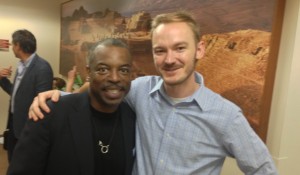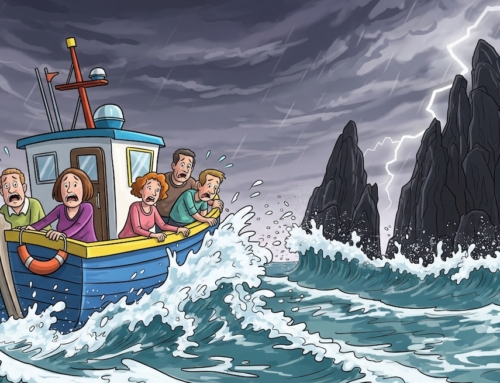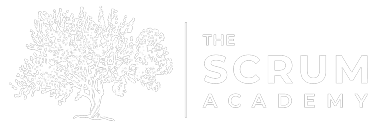
A mechanic is working on a car engine. The mechanic is wearing a blue shirt and a blue hat
If You See a Problem, Fix It – Interview with Jeffry Hesse from National Geographic
 This month, I had the opportunity to interview Jeffry Hesse, Senior Product Manager, Engagement And Identity Platforms at National Geographic. One of the first things that you will notice is that Jeffry is a Star Trek: TNG fan and soon after that you will learn he is a passionate and dedicated Product Owner. It is not very often we hear field stories from Product Owners (I am guessing because they are always so busy), so this interview is a rare treat.
This month, I had the opportunity to interview Jeffry Hesse, Senior Product Manager, Engagement And Identity Platforms at National Geographic. One of the first things that you will notice is that Jeffry is a Star Trek: TNG fan and soon after that you will learn he is a passionate and dedicated Product Owner. It is not very often we hear field stories from Product Owners (I am guessing because they are always so busy), so this interview is a rare treat.
- What was your life like before you began using Scrum? I started in Software Development as a QA working for the data arm of a publishing company. I remember spending a few years really scratching my head as to why I was testing code at the very end, and why I felt an incredible burden for it to be perfect with not very much time at all. Working in a waterfall organization I can remember having to work over many holidays, including an entire Thanksgiving weekend, just to bail out projects that were behind schedule. Of note, I remember putting in gargantuan hours on a project only to watch it completely fail as it was released.
- How did you first become involved with Scrum? I was actually pretty much dragged into Scrum by my old boss, Mike Hansen. I had made the transition from QA to Project Manager and along comes this new development guy who claims he had a better way of getting software developed. At first, since I was a traditional Project Manager I was a bit scared, as it felt like I was losing “power” and becoming less important as I became a Scrum Master. Little did I know that it would be a life changing event and would frame much of what I would do in my career for almost a decade now. I became more interested in Scrum as I moved along, and as I became more familiar with it’s values.
- What is your life like after using Scrum? After beginning to use Scrum, and really taking it all seriously, I watched many things change. I went from being continuously stressed out and overburdened to working forty hours a week and feeling like I was making a difference! I very much loved the idea of delighting a user, and continue to this day get very excited each chance I get to do so. I try to frame each decision I make from the point of view of me end user as I’ve learned that when I do otherwise, it becomes waste. Today, I continue to work as a Product Owner for National Geographic, but I’ve felt compelled to bring much more to the table. I coach others, offer training to what degree I can, and spread the overall love of Agile Development amongst my peers.
- What sort of impact is Scrum having on yourself and your business? Having worked in the publishing industry for almost a decade, I’ve watched the face of Digital completely upend how these organizations used to function. Searching for a way to compete in the disruptive market, all have turned to some flavor of Agile development to speed up their time to market. Particularly at National Geographic, when I arrived the teams I was working with had a bit of a stigma attached to them. I was told they started my Product out as a Waterfall effort and had been trying to implement Scrum along the way, but having a rough time in general. Working with the PMO and the support of the newly adopted ScrumMaster for the team, Matt Hocking, he and I have been continuously looking at process with our team, evoking the teams and stakeholders for feedback, and setting up the practices to allow for rapid innovation at the Society. The results to date have been amazing! We went from low energy teams that were releasing code infrequently to now releasing close to daily in some cases, and with renewed vigor amongst the team members to have fun and enjoy what they do. I’ve also taken very seriously the need amongst Product Owners to address technical debt, and scheduled roughly a month with a team to do just that, so that our code base can be more flexible and easier to implement on top of.
- What challenges did your organization have with adopting Scrum? National Geographic’s challenges in adopting Scrum are that we are a huge organization that had been siloed for many years. The challenge remains, as I find myself tearing down walls daily, talking to people who had not been talked to before, attempting to remove inefficiencies where I can and improve old relationships. The challenge that remains is setting up the organization to approach large projects in a way that doesn’t just start them as a Waterfall effort in Agile disguise. Thankfully, there is management buy in from the top to move away from this, and it feels great as that can be the harder half of the challenge. I work for a guy named Norm Gorcys who has really let me take the bull and ride it daily, which is great.
- What was the biggest personal challenge you had to overcome before you could be successful with Scrum? I had to frame my mind around the values and principles. Being incredibly open to different points of view and approaches felt very different from the Project Management I had done in the past and it took a long time to figure out that it was the best thing to do. I also had to learn to become a servant leader, putting the needs of others in front of mine, empowering others. That in it self can take a very long time to understand and grasp WHY you would want to do that.
- Any words of wisdom you want to share to help people who are just starting out on the journey? If you see a problem, fix it. I’ve spent many years hearing “we can just fix that later” or working in inefficient manners as a result of ignoring problems. I heard Steve Ropa mention at Agile DC that he has no problem getting fired and will speak up on issues as a result, and I thought that was fantastic. It’s tough being transparent, but it pays huge dividends.
Thanks again to Jeffry for taking time to share his journey with us. If you have a story you would like to share for our monthly interviews, please feel free to get in touch via email, Skype or telephone.





